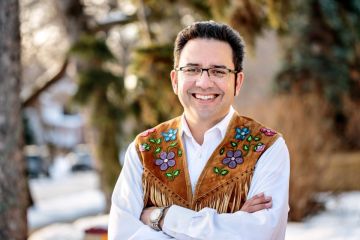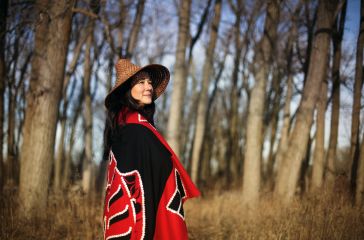Healthy vision
- Jenny Manzer

Boma Brown isn’t a fan of documentary films at the moment. Her boyfriend enjoys watching them, but Brown, 29, spends her days absorbed in serious, often difficult issues. So, during her time off, she turns to reality television or some other light diversion from her work, which includes fighting racism in health care.
It’s no wonder Brown needs mindless entertainment—she wears many hats. She’s the executive director of the Coastal Research Education and Advocacy Network, she volunteers at the Victoria-Harbourside Rotary Club and is the founder and executive director of the Support Network for Indigenous Women and Women of Colour (SNIWWOC), a Victoria-based group devoted to improving access to reproductive health care.
Brown started the group in 2014 while still a UVic social sciences student. She grew up in the predominantly Black countries of Nigeria and Botswana, then spent time in the US as an international student—but didn’t really have her eyes opened to the barriers in health care until her family moved to Canada.
She was a busy, engaged student at UVic, volunteering as soon as she set foot on campus, including serving as a Student Ambassador and starting the popular “puppy play time,” a program to help students relieve stress. One of the first groups she joined was the Students of Colour Collective, which held meetings at the Student Union Building. Through discussions there and around campus, she noticed a common thread: women of colour and Indigenous women were not always getting fair treatment in health care. Brown was one of them.
“There were certain incidents that happened at the doctor, maybe questions the doctors asked me and things like that, that I thought was weird, but didn’t really connect it to a larger picture of oppression,” she says.
Brown began to gather those women together to discuss these incidents and barriers. The first few workshops took place at the Quadra Village Community Centre—in the heart of the neighbourhood on the edge of downtown Victoria that Brown still calls home.
It was just 10, 15, 20 people coming together to talk about reproductive justice and reproductive health and using the knowledge that we’d gained as students. And then think about how this applies to our community and then using art as well—using art and photography to explore reproductive justice.
—Boma Brown, UVic social sciences alum and founder of SNIWWOC
As her work progressed, Brown realized that access to care was not just a student or a neighbourhood issue. Women of colour across Canada have intimate experiences of health care discrimination that need to be addressed on a much larger scale, she says. The network receives calls from women as far away as Chicago and California—a fact that initially shocked Brown.
“I still get sad when I hear of one more person needing our service,” she says. “In an ideal world, the organization would not exist because it would mean there was no racism—it’s heartbreaking there is still a such a gap across Canada and the US.”
She cites dozens of stories of discrimination: everything from women of colour being misdiagnosed, experiencing rudeness and insults, or not being prescribed needed pain medication. There is the erroneous idea among some health care professionals that Black patients do not experience pain, or that Indigenous patients should receive different medication because they are at greater risk of addiction, she says.
The support network hears these stories from patients, but also from health care practitioners about their own profession. “There are so many layers to it.”
Brown was awarded the 2020 BC Multiculturalism and Anti-Racism Award and this year was one of 10 women across Canada nominated for the L’Oréal Paris Women of Worth Award, an honour that earned her $10,000 to fund the network.
She says UVic helped her on her path to becoming a leader, both through her classes, but also from the strong female mentors she had on campus, such as Grace Wong Sneddon. Brown met Wong Sneddon, then the Advisor to the Provost on Equity and Diversity, when Brown was hired to help plan a large, prestigious diversity in research conference.
Boma, when she came to meet with me for the interview, she just shone: her passion, her care, her commitment. We just sort of connected right away.
—Wong Sneddon, adjunct professor in art history and visual studies
Wong Sneddon says Brown was “fantastic” at helping organize the conference. She worked with students, Indigenous scholars and community members, and even helped to write thank-you cards. “She was just everywhere.” While doing this work, Brown had the opportunity to have in-depth conversations about different topics in the areas of diversity.
“I think it gave her a chance to really see possibilities, it wasn’t just the minutiae, the details, but actually seeing the overarching of where leadership and diversity could go. I think that really clicked with her, maybe that’s what sort of set her on her path.”
Brown graduated in June 2014, and SNIWWOC incorporated in October of that year. All the founding board members were UVic alumni and many of them lived in Quadra Village—an affordable area accessible from campus on public transit via the No. 4 bus. The organization is still based from there.
When lawyer Mary Ellen Turpel-Lafond released her report: “In Plain Sight: Addressing Indigenous-Specific Racism and Discrimination in BC Health Care,” the results were not a surprise to Brown. Changing health care outcomes for racialized women is a slow process, says Brown, but they are working away at it with a range of services. SNIWWOC offers one-on-one personal care and support, including counselling, emotional support, career counselling, therapy and peer support. If a woman says she is afraid to go into a clinic setting alone, the support network provides a volunteer to accompany her.
SNIWWOC is currently providing families in need with groceries, since racialized women are disproportionally affected by COVID. Art is also an important part of their work, and a podcast is in development, as are plans to continue their series of successful events. They are also launching a health care app to help women access culturally sensitive, antiracist health care, a projected funded by the City of Victoria.
Wong Sneddon has given workshops at SNIWWOC and has observed what a strong mentor Brown is for her peers. Seeing Brown continue in diversity work is beyond gratifying for Wong Sneddon—particularly at a time when she feels exhausted by recent waves of anti-Asian racism and the gruelling emotions of the Derek Chauvin trial in the US. “Boma’s work gives me that hope that we can go forward,” says Wong Sneddon, who now consults in diversity, equity and inclusion.
“It’s like, oh my gosh, this is what it’s all about. This is like handing over the torch,” says Wong Sneddon. “To see her blossoming and thriving. It’s indescribable. It brings all that hope back.”
In the meantime, Brown somehow also finds time to have fun. Her Instagram page reads “Life is a Series of Outfits.” She enjoys camping, working out, chatting with friends over Zoom, being outside and going out to eat with her friends or her boyfriend, as pandemic restrictions allow.
She believes in work-life balance, and she declines to watch those documentaries when her boyfriend suggests them. “I’m like, no, my job is too serious. I can’t watch anything serious,” she laughs.
Photos
In this story
Keywords: alumni, international, health, COVID, administrative, community, racism, indigenous, student life
People: Boma Brown
Publication: The Torch





